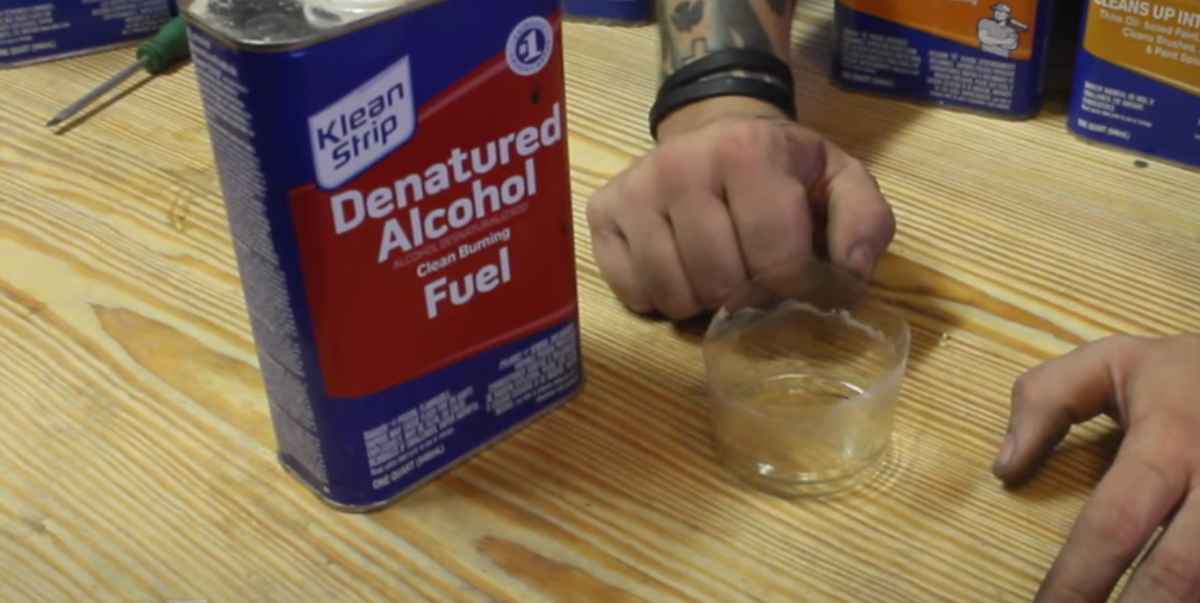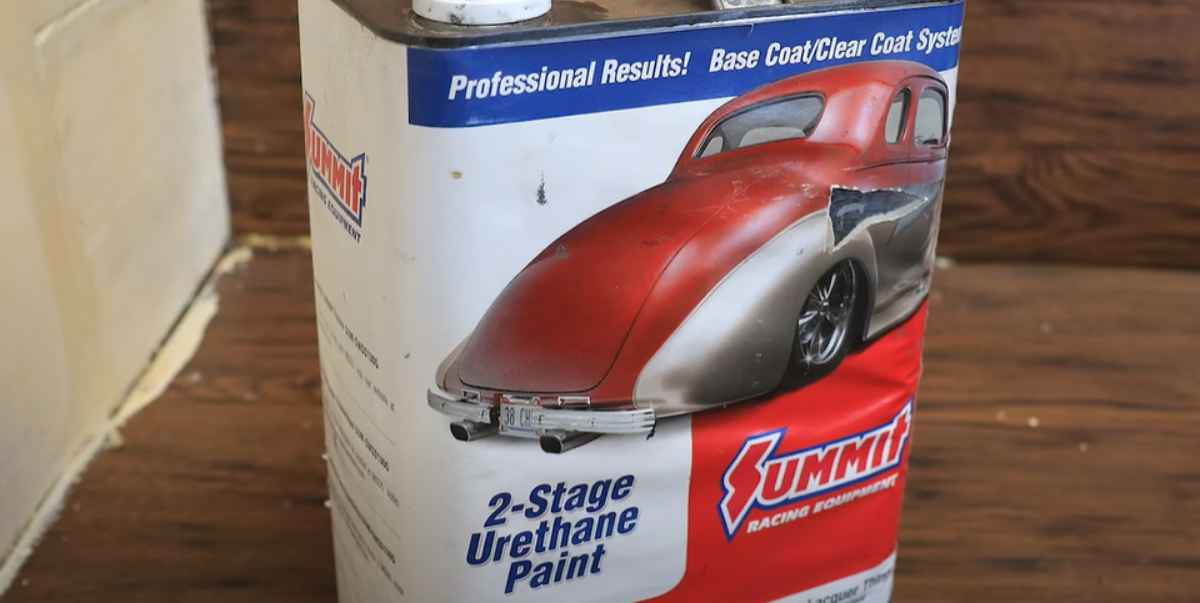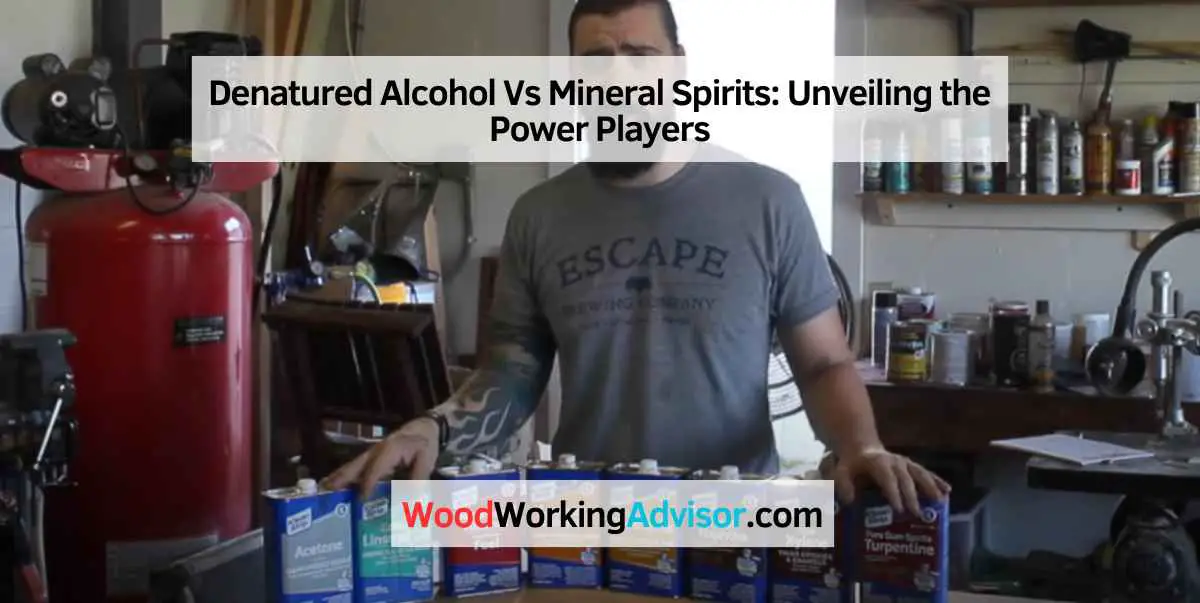Denatured alcohol and mineral spirits are both solvents commonly used in various applications such as cleaning and thinning paint. Denatured alcohol is ethanol mixed with other chemicals to render it unfit for consumption, while mineral spirits are derived from petroleum distillation.
These solvents have their own distinct properties and uses. Denatured alcohol is typically used as a cleaner or fuel for alcohol burners, while mineral spirits are preferred for paint thinning and cleaning paint brushes. Understanding the differences between denatured alcohol and mineral spirits can help you choose the right solvent for your specific needs.
We will explore the characteristics, applications, and safety considerations of these two solvents.
Chemical Composition
Understanding the chemical composition of denatured alcohol and mineral spirits can help you choose the right solvent for your specific needs. Both substances have distinct properties due to their unique constituents. In this section, we will delve into the chemical composition of denatured alcohol and mineral spirits, highlighting their differences and applications.
Denatured Alcohol
Denatured alcohol, also known as methylated spirits, is a type of alcohol that has additives to render it unfit for consumption. It is primarily composed of ethanol, a colorless and volatile liquid, which is derived from various sources such as corn, sugarcane, or grain. To prevent it from being consumed as a substitute for alcoholic beverages, denatured alcohol is mixed with denaturants such as methanol, acetone, or isopropyl alcohol.
Denatured alcohol is renowned for its ability to dissolve oils, wax, and greases, making it a popular choice for cleaning surfaces and preparing them for painting or varnishing. It evaporates quickly, leaving no residue behind, which is ideal for applications where a clean surface is essential. Additionally, denatured alcohol is commonly used as a solvent in the production of shellacs, fuels, and personal care products.
Mineral Spirits
Now, let’s shift our focus to mineral spirits, another commonly used solvent with a distinct chemical composition. Mineral spirits, also called white spirits or paint thinners, are petroleum-derived solvents. Unlike denatured alcohol, mineral spirits are not produced through fermentation but rather through a refining process that separates crude oil into its various components.
The main constituents of mineral spirits are hydrocarbons such as alkanes, cycloalkanes, and aromatic compounds. These hydrocarbons give mineral spirits its characteristic properties, including its low odor and high solvency power. Mineral spirits are widely used in cleaning and degreasing applications, as well as in the paint industry, where they act as a thinning agent for oil-based paints, varnishes, and enamels.
Compared to denatured alcohol, mineral spirits have a slower evaporation rate, allowing more time for the solvent to penetrate and loosen tough stains or deposits. Their moderate evaporation rate also makes them suitable for applications where longer working times are required. However, it’s crucial to note that mineral spirits can leave a residue behind, which is something to consider when choosing a solvent for specific projects.
| Denatured Alcohol | Mineral Spirits |
|---|---|
| Ethanol (70-99%) | Alkanes (C7-C12) and Aromatic Compounds |
| Denaturants (e.g., methanol, acetone) |
In summary, denatured alcohol primarily consists of ethanol mixed with denaturants to make it unsuitable for consumption. On the other hand, mineral spirits are petroleum-derived solvents composed of various hydrocarbons. Understanding their chemical composition and specific properties will help you determine the most appropriate option for your intended use.

Characteristics And Uses
Denatured alcohol and mineral spirits are commonly used solvents that offer unique characteristics and have various applications. Understanding their differences can help you choose the right solvent for your specific needs. Let’s take a closer look at the characteristics and uses of denatured alcohol and mineral spirits.
Denatured Alcohol
Denatured alcohol, also known as methylated spirits, is a versatile solvent commonly used in many industries. It is ethyl alcohol mixed with additives to make it unsuitable for consumption, hence its name “denatured.”
| Characteristics | Uses |
|---|---|
|
|
Mineral Spirits
Mineral spirits, also known as white spirit or paint thinner, is a petroleum-based solvent commonly used for cleaning and thinning purposes.
| Characteristics | Uses |
|---|---|
|
|
Safety Precautions
When working with denatured alcohol or mineral spirits, it is important to follow certain safety precautions to ensure your well-being and minimize the risk of accidents. Let’s explore the safety guidelines for handling these two common solvents.
Denatured Alcohol
Denatured alcohol is a powerful solvent that is commonly used for various applications, such as cleaning surfaces or thinning paints. While it is a versatile substance, it is important to take the necessary safety precautions when working with denatured alcohol.
- Use in a well-ventilated area: The fumes produced by denatured alcohol can be harmful if inhaled in high concentrations. Always ensure there is proper ventilation in the area where you are using it.
- Avoid direct contact with skin: Denatured alcohol can cause skin irritation and dryness. To protect your skin, wear chemical-resistant gloves when handling it.
- Avoid contact with eyes: If denatured alcohol comes into contact with your eyes, it can cause severe irritation. In case of accidental contact, immediately flush your eyes with water and seek medical attention if necessary.
- Keep away from open flames: Denatured alcohol is highly flammable, so ensure that you are far away from any open flames or sparks while working with it.
Mineral Spirits
Mineral spirits, also known as white spirits, is another common solvent used for thinning oil-based paints, cleaning brushes, or degreasing surfaces. While it is generally considered less hazardous than denatured alcohol, it is still important to handle mineral spirits with caution.
- Use in a well-ventilated area: Similar to denatured alcohol, mineral spirits should be used in a well-ventilated space to prevent inhaling harmful fumes.
- Wear protective gloves: To protect your skin from irritation, wear chemical-resistant gloves when working with mineral spirits.
- Avoid ignition sources: Mineral spirits have a low flash point and can easily ignite. Keep them away from open flames, sparks, or any other ignition sources.
- Dispose of properly: After use, mineral spirits should be disposed of according to local regulations. Never pour them down the drain or throw them in the trash.

Frequently Asked Questions Of Denatured Alcohol Vs Mineral Spirits
What Is A Good Substitute For Denatured Alcohol?
An alternative to denatured alcohol is isopropyl alcohol, which is commonly used as a disinfectant. It has similar properties and can be used for cleaning, degreasing, and as a solvent.
Why Use Denatured Alcohol On Wood?
Denatured alcohol is used on wood because it effectively cleans and removes stains, grease, and dirt. It also helps to prepare the wood surface before painting or staining.
Is Paint Thinner A Denatured Alcohol?
No, paint thinner is not the same as denatured alcohol.
Is Denatured Alcohol Just Rubbing Alcohol?
Denatured alcohol is not the same as rubbing alcohol. Although both are types of alcohol, denatured alcohol has additional chemicals to make it poisonous or bad-tasting, while rubbing alcohol has isopropyl alcohol.
Conclusion
To sum up, both denatured alcohol and mineral spirits are effective solvents with their own strengths and applications. Denatured alcohol is commonly used in cleaning and disinfecting, while mineral spirits is preferred for paint thinning and degreasing. Understanding the specific properties and uses of each can help you make the right choice for your project.
So, next time you’re faced with a cleaning or DIY task, be sure to consider which solvent is the best fit.


